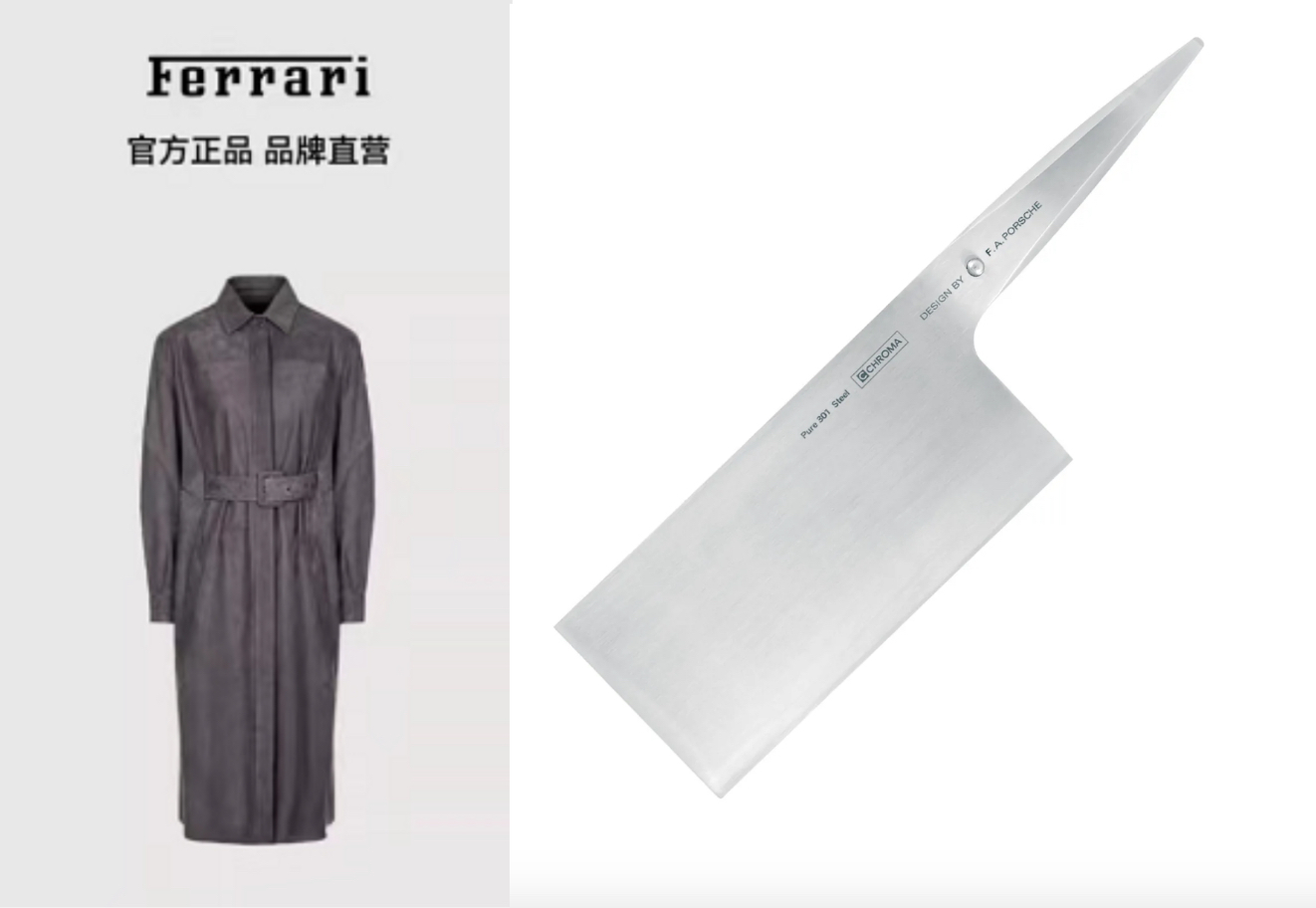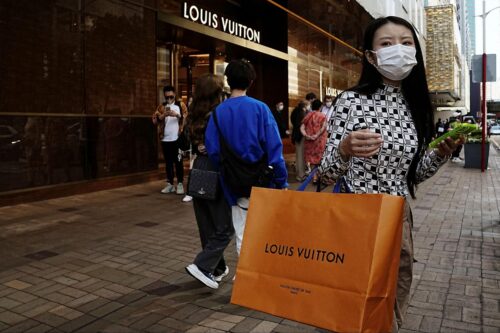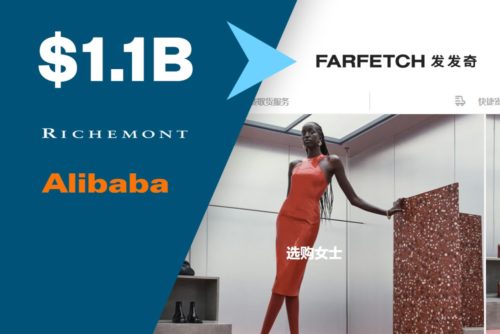A Porsche kitchen knife and Ferrari trench coat confuse the Chinese internet
Prestigious car manufacturers are turning to homewares and fashion to give loyal customers a chance to not only drive their vehicles, but live in their image, too. But the trend isn’t sitting well with many Chinese internet users.

Every once in a while, Chinese social media users stumble across a consumer product that baffles them, and revel in the joy of calling it out online. The latest entry in this genre: a kitchen knife by German luxury sports car brand Porsche and a trench coat by its Italian competitor Ferrari, which have caused a stir for their eyebrow-raising prices.
The homeware that landed Porsche in controversy is from Porsche Design, a subsidiary of the famed German automaker, whose product portfolio includes everything from sunglasses to kitchen appliances to car accessories. Priced at $240 and named “P22 China Knife,” the meat cleaver features a blade crafted of rustproof Japanese Pure 301 stainless steel and an ergonomic stainless steel handle. The only embellishments are a metal nub that marks the end of the handle and a few stamped graphics. The blade itself is almost 17 centimeters (6.7 inches) long, and the knife weighs around 320 grams (11.2 ounces).
China news, weekly.
Sign up for The China Project’s weekly newsletter, our free roundup of the most important China stories.
The item is branded as a “standard knife from China,” which is “indispensable for the oriental kitchen,” according to Porsche Design’s website. At the time of writing, it’s sold out in regions such as the U.S., Canada, and Switzerland.
Despite its Chinese heritage, the product is unavailable for shipping to China. But it still made the rounds online when a Weibo user shared a screenshot of the knife’s page, prompting several trending topics and a flurry of posts expressing confusion over the price. “I don’t see it any different from the knife I got from a grocery store,” a Weibo user said. Some commenters took specific issue with the cleaver’s minimalistic design. “Who would pay that much money for a kitchen knife that doesn’t even have a comfortable handle to grip?” another person wrote.
Roughly a week after the knife debate, Ferrari found itself in a similar situation because of a women’s mid-length trench coat sold in its clothing store on China’s ecommerce platform Taobao. As Ferrari’s first official introduction of its apparel collection to Chinese consumers, the online shop will open for preorders on October 24, selling a wide array of items including clothing, accessories, and bags, with prices ranging from 630 yuan ($87) to 44,500 yuan ($6,780) — which is how much the trench coat costs.
Made with “fine Italian craftsmanship” and of 100% leather, the coat has “a timeless elegance” that makes it special, according to Ferrari’s website. “Made from soft nubuck, the garment is enhanced with inserts with fine perforations on the yoke, sleeves and sides,” its description says.
Launched in June 2021, Ferrari’s first-ever clothing line is designed by its creative director Rocco Iannone, who formerly made wonders at luxury fashion houses such as Giorgio Armani and Dolce & Gabbana. With a sporty and futuristic bent, Ferrari’s clothes not only have the automaker’s iconography incorporated in their prints, they also have inherited the Maranello-based brand’s high-end image, with extravagant runway shows being held during the prestigious Milan Fashion Week.
So understandably, as part of Ferrari’s fall 2022 high-fashion collection, the trench coat is pricey. But its listing on Taobao still attracted a great deal of attention, with internet users marveling at its price. “I guess for someone who can’t afford a Ferrari car but still wants a little of that Ferrari flair, a Ferrari-branded trench coat is a reasonable purchase,” one Weibo user quipped.
According to American consultancy Bain & Company, the world’s leading advisor to the global luxury goods industry, despite a slump in Chinese retail sales overall since the pandemic began in 2020, sales of personal luxury goods in mainland China rose by 36% to 471 billion yuan ($65.4 billion) in 2021 from the prior year, which kept the country on track to become the world’s largest luxury goods market by 2025.
In China, loyal customers of premium brands are willing to shell out a substantial amount of money for almost anything that’s attached to the company. For example, the name of French luxury design house Hermès, which is known for its leather garments, carried enough cachet to attract Chinese buyers for a handmade bicycle priced at 165,000 yuan ($24,470).
When it comes to ultra-luxury car manufacturers expanding their brand reach, Porsche and Ferrari are not alone in entering new fields in recent years. Mercedes-Benz, which now bills itself as a luxury lifestyle brand, tested the waters with fashion last year, releasing a capsule collection in collaboration with Virgil Abloh, the visionary creator of Off-White and the head of Louis Vuitton menswear (Abloh died of cancer last November, and was honored by Mercedes with a show car).
Although many Chinese social media users expressed surprise at Porsche and Ferrari, as car brands, selling items that are unrelated to automobiles and seemingly overpriced, others were indifferent. They pointed out that such products were essentially targeting the same set of wealthy customers who aren’t likely to flinch at spending an absurd amount of money on a luxury car in the first place. “The brands know that lush life isn’t all expensive cars, and there are plenty of people in China who will buy into the lifestyle they are preaching,” a Weibo user said.



